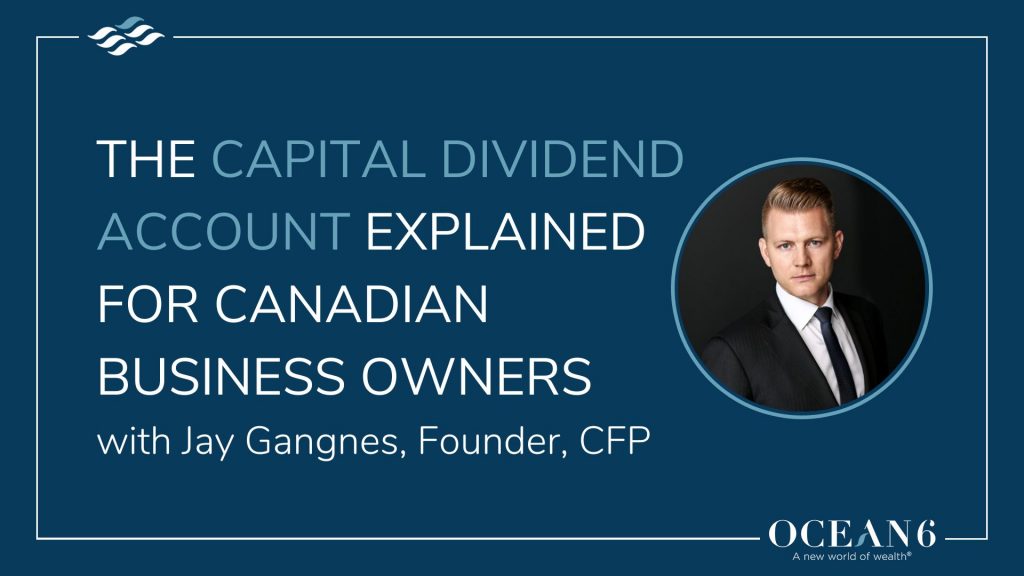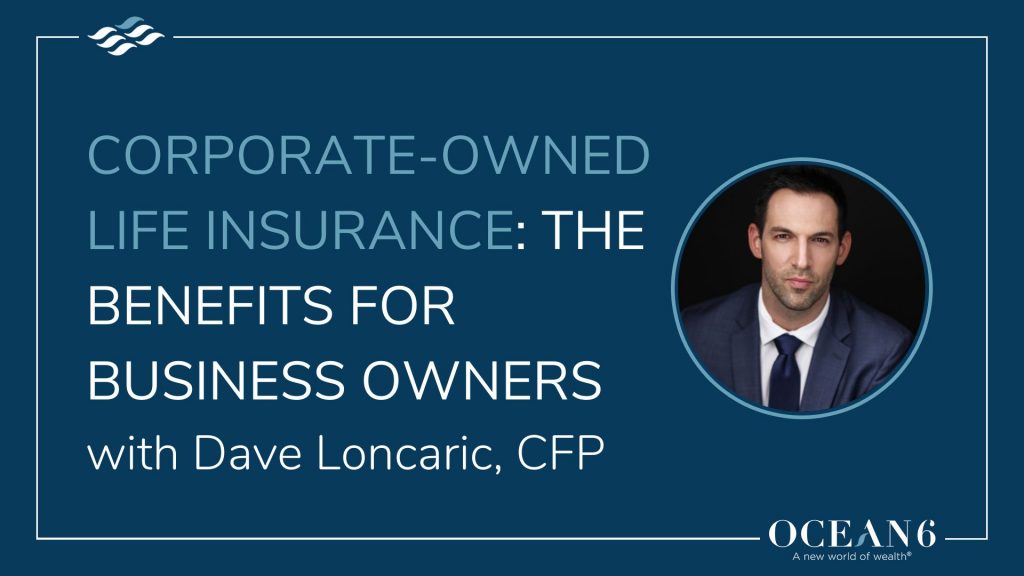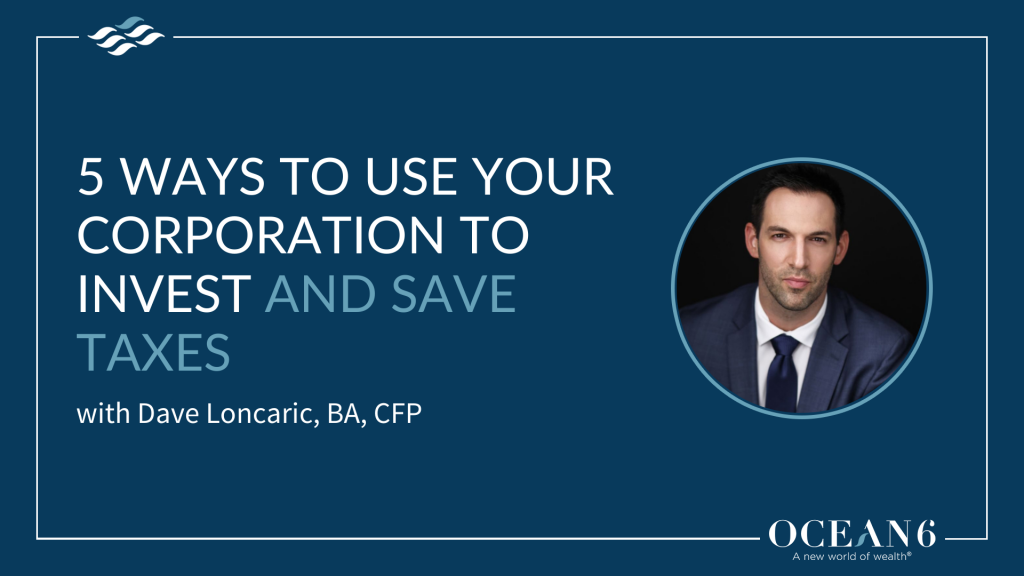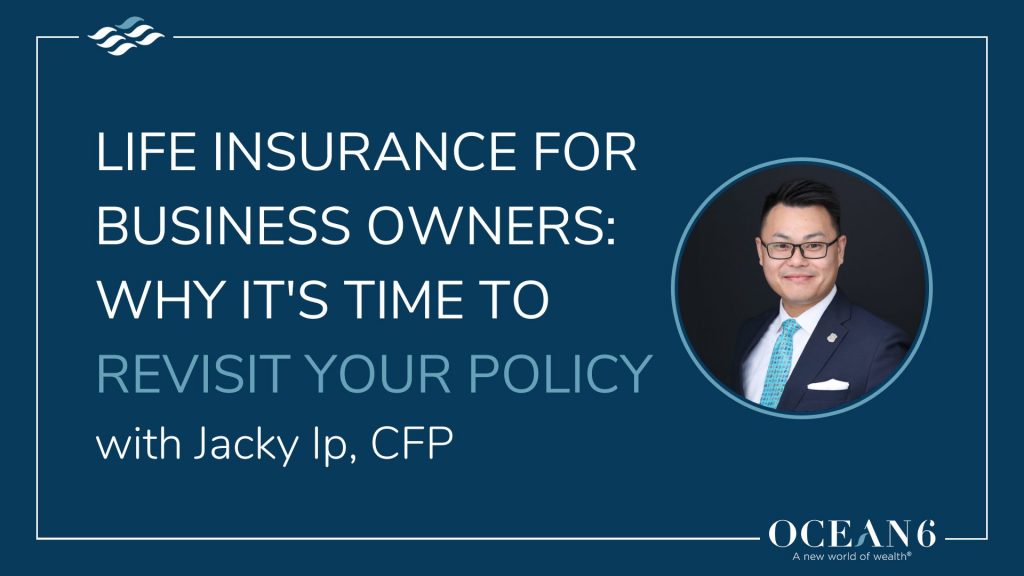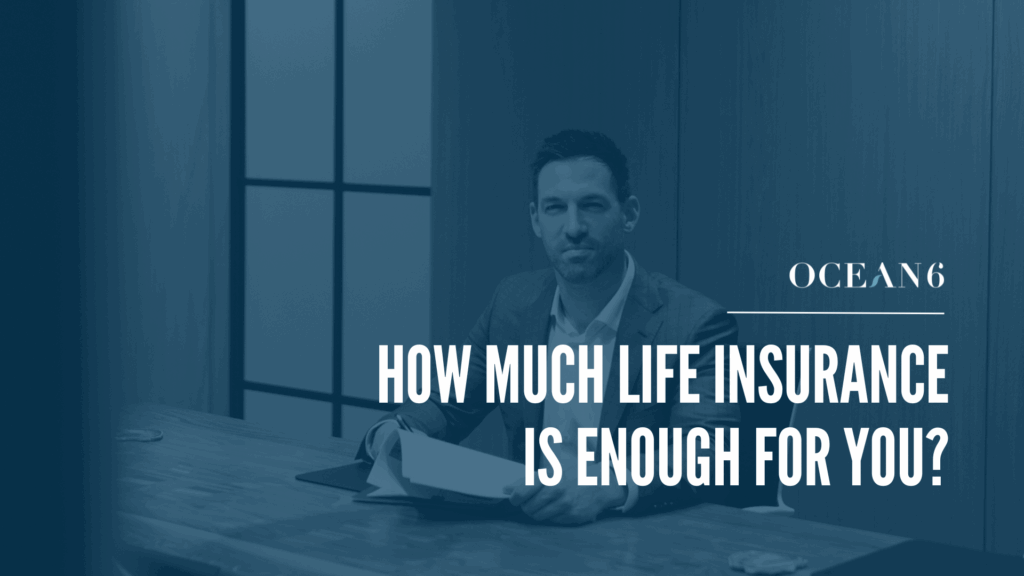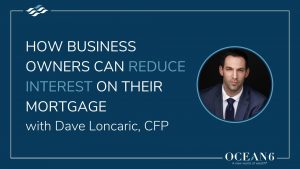What goes into an effective insurance strategy for business owners? The truth is if business owners want the correct amount of insurance coverage, organized in the most tax-efficient way, it is more complicated than you think.
A lot of times, we buy insurance and hope we don’t have to use it. But the truth is, insurance can be one of the most powerful and effective financial planning vehicles available to business owners.
Insurance Strategy and Financial Planning for Business Owners
When you work with Ocean 6, we don’t just consider insurance for when you pass away. We use life insurance as an innovative financial planning tool.
Should I choose term or permanent life insurance?
Term insurance is designed to protect you for a specific period of time, maybe ten or twenty years. You pay every year, and once that term is complete, you would have two primary options; first is that you could renew your coverage which will increase the price you’ll need to pay going forward, and eventually, it will expire and you can no longer be renewed. The second is that you could convert it into permanent life insurance. It is less expensive upfront than permanent insurance but tends to be used for a temporary need.
For example, if you have young children and a large debt, such as a mortgage or a business loan, you could take term insurance to protect your income and take care of them if anything were to happen.
With permanent life insurance, your coverage will last for your lifetime. It is also used as an innovative insurance strategy for asset growth and future tax planning.
In short, permanent insurance is an asset, and term insurance is an expense. But there’s a time and place for both.
What is the difference between Critical Illness and Disability Insurance?
Critical Illness and Disability Insurance are described as living benefits. They are both available to protect you if you were to contract an illness or injury. However, the significant difference between the two is the way the contract pays out and what type of situation it covers.
Critical Illness Insurance covers you if you were to get a major illness and the policy covers a range of life-changing illnesses. We recommend researching what is covered and their specific definitions because they can vary by provider. In the event you’re diagnosed with a covered illness, you’ll be paid out a lump sum of tax-free money.
On the other hand, Disability Insurance is an income replacement tool that covers you for the length of your contract should you be unable to work. This can be anywhere from two years up until the age of 65. You’ll start to receive this monthly payout once you have satisfied the waiting period of being unable to work. The benefits would be received as tax-free income if you purchased this in your personal name.
It is important to note that while we try to keep most of our expenses inside the corporation as much as we can, Critical Illness and Disability Insurance is best kept in our personal name because this will ensure we receive the benefits tax-free. Otherwise, the benefits will be paid into the corporation first and we would have to deal with the taxes when we take it out.
Bonus Insurance Strategy Tip
When it comes to making a claim, always come to your financial advisor for direction. Your doctor or family members are not the people who you should be asking for insurance advice. We had one client who didn’t claim a critical illness for over three years when they should have because they were told it would impact their existing life insurance, which is not true. They almost missed out on the payout.
At Ocean 6, we are always on our clients’ side making sure our clients don’t get confused by all the noise that is out there when it comes to protecting your biggest asset.
Purchasing Life Insurance Through Your Corporation
Why should I own insurance inside my corporation?
Let’s break the benefits of owning life insurance inside your corporation down even further.
The cost of funding insurance is lower if paid by the corporation. Why? Because of the lower tax bracket on the dollars, you earn inside the corporation! The corporate tax bracket for the first $500,000 earned is only 11% in British Columbia as opposed to your personal tax rate—this could be as high as 50%!
For example, if your corporation earns $100, you’re left with $89 (after taxes) to purchase life insurance. Now compare this to earning that same $100 as an individual. In that case, you would be left with $50 (after taxes) to buy life insurance.
Business owners can also benefit from tax-deferred growth on the value of the investments in a permanent life insurance policy held within the company. This benefit can be compared to tax-deferred growth such as RSPs.
As for another reason, permanent life insurance is attractive for a corporation? When you pass, it allows for the benefit to be transferred to the estate tax-free through the capital dividend account.
This is a frequently overlooked method for business owners to save taxes, but it’s one that can pay off in a big way. So, yes, own your life insurance inside the corporation. But always make sure the corporation is the owner, the payer, and the beneficiary to make sure you maximize those tax benefits.
Want to learn even more about purchasing insurance through your corporation? Take a look at this post.
When to Revisit Your Life Insurance
Life insurance policies aren’t always a “set it and forget it” financial strategy. You will need to revisit them regularly. Life insurance policies require occasional upgrading and reevaluation for many business owners to ensure they still meet your needs as your life and business change.
We have another helpful video and accompanying blog post all about revisiting your life insurance policy right here.
How To Use Life Insurance For Retirement
Any conversation about an insurance strategy for a business owner also needs to include using insurance for retirement. In fact, life insurance can serve as a powerful retirement planning tool in two ways. One, because it offers a tax-efficient way to grow your money. And two, because it allows you to take money out of your corporation tax-free if done correctly.
On that same note, there are three ways to access cash from your life insurance for your retirement income:
- A direct withdrawal
- A policy loan
- A collateral loan from approved banking institutes.
Head to this post next to learn more, including how to assess your life insurance needs as a business owner.
How To Calculate How Much Life Insurance You Need
First, look at the reasons why you are buying insurance. Is it to protect your debt or to provide ongoing income to your loved ones in the event of death? Once you’ve understood your goals, you should always do a needs analysis to ensure you are not under-insured or over-insured.
Insurance is very personal. Two individuals could be in a similar financial situation but have very different insurance needs. It all comes down to what your goals are, so make sure you do your due diligence.
Assessing your life insurance needs includes calculating how much coverage is right for you. To start, you will add up all of your financial commitments you want covered by life insurance.
The sum of these expenses gives you a starting point of how much life insurance you need:
- Savings
- Debt repayment (here’s how to structure your debt so you can win)
- Distribution of assets
- Final expenses
Next, you will calculate the ongoing income required to support your family. To do this, we recommend using what is known as the “10 and 20 times income rule,” and you can read all about it here.
By adding up your financial commitments and the ongoing income you need for your family, you’ll be able to determine your total insurance needs. Not only will you have the coverage you need, but it will also give you a lot of peace of mind knowing it’s there.
How To Assess Your Life Insurance Needs for Your Insurance Strategy
Do you not yet have any life insurance? Or are you wondering if you’re utilizing your current life insurance policy to its full benefit?
Then here are some considerations you’ll need to cover:
- Start by reviewing your current financial plan and ask yourself if there is a need and a benefit for having life insurance.
- Take a look at your current life insurance policies. See if you can take advantage of the things that you have already built. Maybe you already have in your portfolio a whole life or universal life in your portfolio but have not realized that it can be used as a retirement fund. Take a look at your company. Is there any investment capital that is not being utilized? Take the time to review those and start putting the money towards your retirement plan.
When used correctly, life insurance can be the most tax-efficient tool you have in your corporation. It is almost like having your tax-free savings account inside the corporation!
Life Insurance as an Investment Strategy
Why would I put money in life insurance when I can invest it elsewhere, such as the stock market, real estate, or my business?
Let’s say your goal is to get the highest return on investment short term. In that case, life insurance is probably not the best option. Comparing these strategies side by side is like comparing apples to oranges.
Life insurance can be complicated, but it is a very valuable tool because of the year-on-year tax benefits. In a corporation, those benefits are magnified because the dollars that have been allocated have been taxed at a much lower bracket.
Keep in mind, when investing in life insurance, you must speak to a professional and get clear about what they are there to do. Make sure they are looking at your goals first and integrating an insurance strategy based on the life you want to live.
Are there any benefits a life insurance policy can provide while I am alive?
Yes, Universal Life and Whole Life insurance offer a way to invest additional money inside the policy and receive tax-exempt growth.
If it’s Universal Life, you can choose your own investments. If it’s Whole Life, you are essentially investing in the insurance company and receiving a dividend. Either way, if it is well managed, you will see growth in the money you put in.
How We Can Help You Create an Effective Insurance Strategy
We have covered a lot in this post, but there is even more that goes into creating an effective insurance strategy for business owners. At Ocean 6, we are determined to make sure you maximize every benefit and opportunity available to you. Not only can we help you address and answer all of these considerations, but we have a number of other strategies to help you create the financial future you dream of.
Book a call today so we can get started. In the meantime, we have a comprehensive FAQ page.
